Survey Shows What Americans Would Sacrifice to Give Up Heartburn for Good
A Drugwatch survey revealed that 28% of Americans would stop drinking alcohol if it meant never experiencing heartburn or acid reflux again. Since more than 60 million people suffer from heartburn at least once a month, we studied our survey results closely and identified seven tips to soothe the burn.

- Approximately 20% of the American population has gastroesophageal reflux disease (GERD).
- 28% of people would give up drinking alcohol to avoid future heartburn and acid reflux.
- 21% of American adults are not willing to give up any of their favorite foods or drinks to avoid heartburn.
- At 30%, adults ages 18-29 are the most willing to ditch alcohol instead of any other food or beverage, while only 20% of those over the age of 60 are willing to do the same.
- 37% of Americans feel frustrated when they develop heartburn symptoms.
Which Activities Are Americans Willing To Give Up Most?
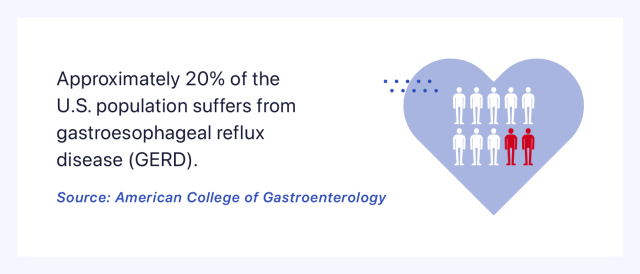
An uncomfortable burning sensation in your chest or throat is a typical sign of heartburn. It is commonly caused by acid reflux, a condition which develops when acidic stomach contents enter your esophagus repeatedly over time.
If you suffer from heartburn two or more times a week, you should speak with a medical professional about gastroesophageal reflux disease, also known as GERD. Researchers estimate that up to 20% of the U.S. population has GERD. In addition to causing discomfort, GERD is a major health risk. About 10%-15% of those affected develop Barrett’s Esophagus, a condition caused by damaged esophageal lining cells, which can develop into throat cancer.
We surveyed more than 1,000 individuals over the age of 18 to identify their perspectives on managing heartburn and acid reflux. Based on our results, many respondents would happily trade some of their favorite activities in order to never face the familiar burn of acid reflux again.
Americans Would Give Up Alcohol and Smoking To Be Heartburn-Free
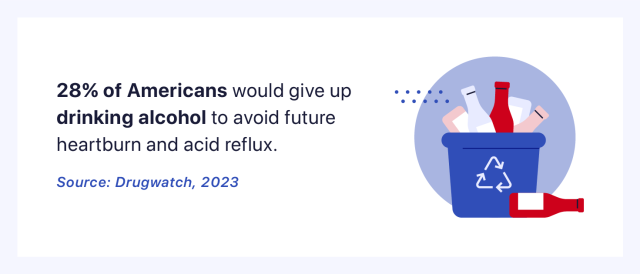
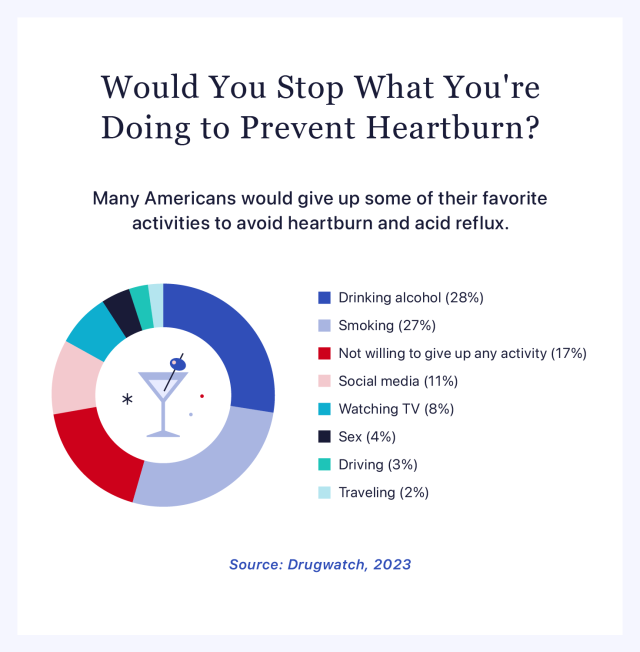
Twenty-eight percent of people would volunteer to give up drinking alcohol in exchange for never experiencing the discomfort of heartburn again. Smoking placed a close second, with 27% of respondents asserting their willingness to not light up again. And 17% of participants noted that they were unwilling to give up any favorite activity in exchange for eternal heartburn relief.
Upon closer examination along gender lines, the data reveals that women are more willing to give up drinking alcohol than men, at 31% vs. 25%, respectively. Conversely, men are more willing to give up smoking than women, at 30% vs. 25%, respectively. The survey also revealed that women (20%) are more unwilling than men (15%) to consider giving up an activity.
These findings correlate to two risk factors that are known to cause or exacerbate GERD. Many alcoholic beverages have a high acid content, which can trigger heartburn symptoms or make existing symptoms worse. And smoking or inhaling secondhand smoke can weaken the muscles in your esophagus, leading to new or worsening existing GERD symptoms.
1 in 5 Are Unwilling To Give Up Any Favorite Food or Beverage
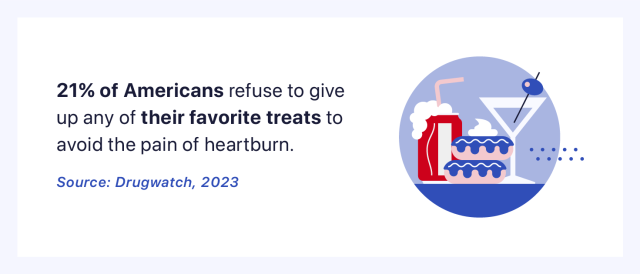
Young adults between the ages of 18-29 are the most willing to skip drinking alcohol, with 30% preferring the symptom relief. In contrast, only 20% of those over the age of 60 are willing to do the same.
- 28% of 60+ adults
- 22% of adults ages 45-60
- 19% of adults ages 30-44
- 17% of adults ages 18-29
It’s also interesting to note that being older seems to indicate an unwillingness to give up any beloved food or beverage options.
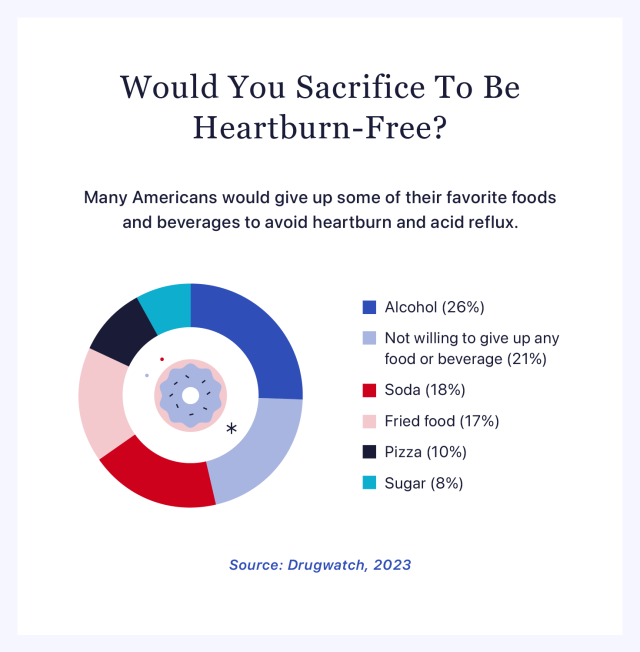
When looking at sacrificing popular food or beverages in exchange for no more heartburn or acid reflux, alcohol was the first choice once again for 26% of respondents. But more than 21% of people noted they weren’t willing to give up any of their favorite treats to avoid the discomfort of heartburn.
Young adults between the ages of 18-29 are the most willing to skip drinking alcohol, with 30% preferring the symptom relief. In contrast, only 20% of those over the age of 60 are willing to do the same. And, upon examination of the other choices available, women were more likely than men to give up either soda (20% vs. 17%, respectively) or fried food (19% vs. 14%, respectively). Both soda and fried foods are known triggers that can worsen GERD symptoms.
- 28% of 60+ adults
- 22% of adults ages 45-60
- 19% of adults ages 30-44
- 17% of adults ages 18-29
What Emotions Come With Heartburn?
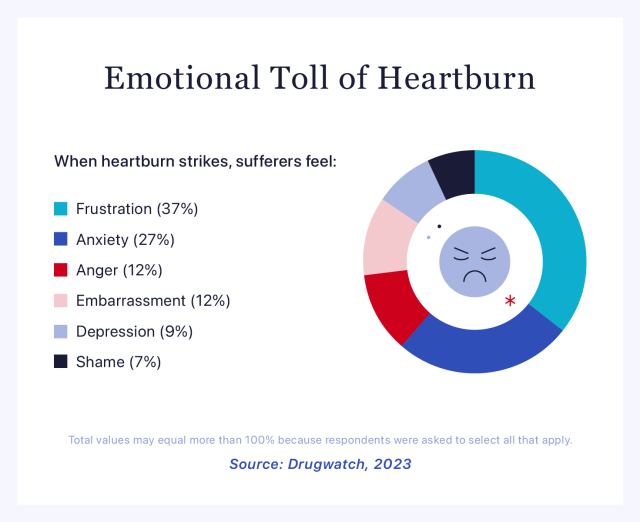
According to the American College of Gastroenterology, 15 million people across the country experience symptoms of heartburn every single day. This pervasive amount of discomfort inevitably takes a toll on their emotional and mental health. Our survey revealed 37% of Americans feel frustrated when they have heartburn symptoms. And 27% experience anxiety about it, while 12% are embarrassed and 12% are angry.
Our survey respondents specified they most often experience heartburn either a few times a year (24%) or a few times a month (21%), but 15% experience it every day. And for 28%, symptoms typically last less than 30 minutes. Overall, 72% said their symptoms are usually gone within two hours or less. Thirteen percent of participants noted that they never get heartburn or acid reflux of any kind.
7 Tips for Minimizing GERD Symptoms
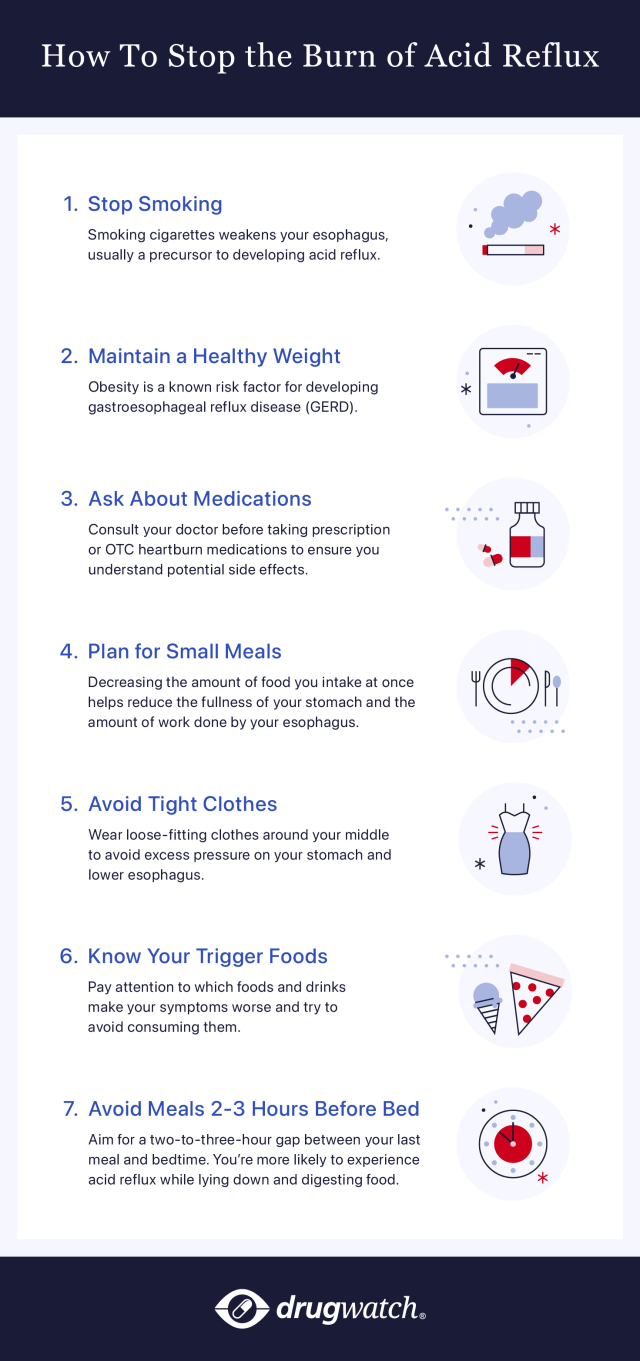
Diet and lifestyle changes are a good place to start in your efforts to decrease the frequency and intensity of heartburn. Here are some simple strategies to help you find relief.
1. Break Your Smoking Habit
Nicotine weakens the lower esophageal sphincter, which is responsible for keeping stomach acids from splashing back up into your esophagus. If it loosens, you are much more likely to develop acid reflux.
2. Prioritize a Healthy Diet and Exercise
Obesity is a known risk factor for developing GERD, so incorporating regular exercise and a healthy diet that prioritizes fresh fruits and vegetables can help lower your risk.
3. Take Medications Upon Doctor’s Advice
Prescription and over-the-counter medications are readily available to both prevent and treat heartburn. Proton pump inhibitors (PPI), including brand names such as Prilosec, Nexium and Prevacid, are commonly used to treat gastrointestinal disorders. But they are not without some risk, as long-term use can result in serious PPI side effects. Consult with your doctor before beginning any medication.
4. Eat Smaller Portions
Eating smaller, more frequent meals will slow down your food consumption. Doing this decreases the amount of food that must go through your lower esophageal sphincter at one time, thus reducing strain and preventing it from becoming too loose.
5. Wear Comfortable and Loose-Fitting Clothes
Avoid wearing tight clothes that may restrict around your middle. Tightly fitting pants and belts can apply pressure on your stomach and lower esophagus, increasing the potential for acid reflux.
6. Avoid Trigger Foods
Identifying which foods and drinks may trigger heartburn symptoms is unique to every individual. By limiting your intake of these items, you can significantly decrease your potential for recurring heartburn. In general, the most common culprits include:
- Acidic foods, such as tomatoes and citrus
- Alcohol
- Caffeinated beverages, including coffee, tea and soda
- Chocolate
- High-fat foods
- Spicy foods
7. Don’t Eat Within 2-3 Hours of Bedtime
Allow yourself two to three hours after eating before you lie down to go to bed. Remember that when you are in a fully reclined position after a meal, gravity is not as effective at pulling food through your digestive system, so it takes longer to digest your food. There is also more opportunity for stomach acids to flow toward the esophagus, which causes heartburn.
Whether you experience heartburn consistently or sporadically, its impact on 20% of the U.S. population is important in understanding a healthy digestive system. Fortunately, there are simple steps you can take to mitigate the painful discomfort that comes with heartburn, acid reflux and GERD.
Methodology
The survey of 1,004 U.S. adults 18+ was conducted via SurveyMonkey for Drugwatch on Feb. 21, 2023. Data is unweighted and the margin of error is approximately +/-3% for the overall sample with a 95% confidence level.
Calling this number connects you with a Drugwatch representative. We will direct you to one of our trusted legal partners for a free case review.
Drugwatch's trusted legal partners support the organization's mission to keep people safe from dangerous drugs and medical devices. For more information, visit our partners page.

